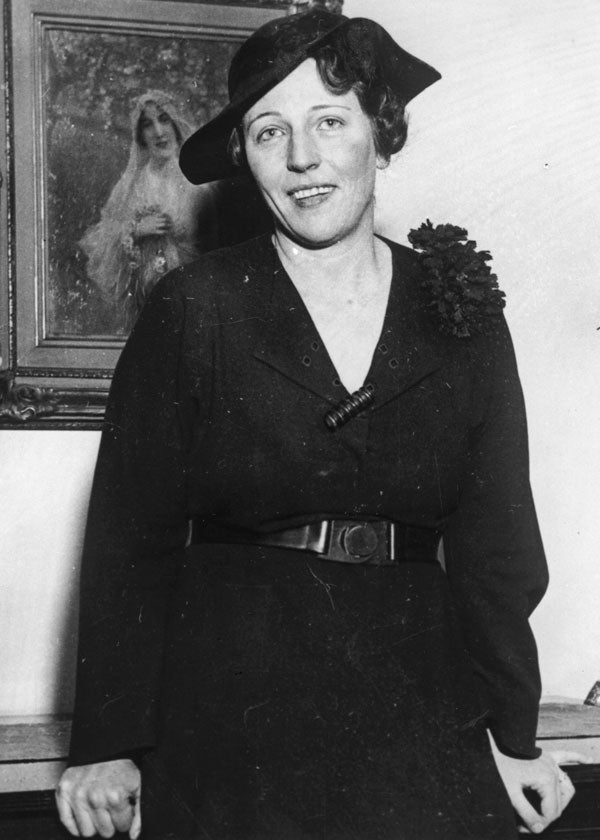Burying the Bones: Pearl Buck in China, By Hilary Spurling

Your support helps us to tell the story
From reproductive rights to climate change to Big Tech, The Independent is on the ground when the story is developing. Whether it's investigating the financials of Elon Musk's pro-Trump PAC or producing our latest documentary, 'The A Word', which shines a light on the American women fighting for reproductive rights, we know how important it is to parse out the facts from the messaging.
At such a critical moment in US history, we need reporters on the ground. Your donation allows us to keep sending journalists to speak to both sides of the story.
The Independent is trusted by Americans across the entire political spectrum. And unlike many other quality news outlets, we choose not to lock Americans out of our reporting and analysis with paywalls. We believe quality journalism should be available to everyone, paid for by those who can afford it.
Your support makes all the difference.At 11, on holiday in a small Indian town, I found, hidden away among the Moravias, Murdochs and Sartres on my aunt's bookshelves, Pearl Buck's fictionalised account of the reign of China's last empress. An inveterate reader of historical fiction, I was familiar with Vidal's Julian and Graves's Claudius, and on a lower level Irwin's Mary Stuart and Plaidy's Lucrezia Borgia. Imperial Woman was a rich narrative that combined the documentary power of the former with the boudoir histories of the latter, while chronicling a period, and place, closer to my own.
Buck was a perennial on family bookshelves and in old volumes of Reader's Digest. Though she also wrote America, her fictions always returned to Asia - Korea, India, China. Unlike her Raj contemporaries, she attempted to do so with an insider's eye, or from a perspecive split between native and foreigner, the two sides of her divided self.
In my teens, living in England, I came upon her late work Mandala, set entirely in India. I was old enough to recognise a foreigner's distanced perspective in her attempt to portray Asian reality. It was China, though, with which Buck was associated: who could forget the Chinese drag of the stars in the Hollywood melodrama The Good Earth, based on her Pulitzer-winning bestseller, and the exotic floral names the characters in her Oriental novels bore? Or the loping-gazelle prose of her early fictions, in which the near-present was enveloped in the brocaded language of legend and fantasy?
Yet when I read Marina Warner's factual account of the Dragon Empress, I was still reminded of Buck's compelling fictional version. Then, before the discovery of post-colonialism, I was studying the fictions of Westerners unable to abandon Asian settings, notwithstanding the liberation struggles and revolutions that had transformed the world they knew. Buck was renowned as a figure who, from her American vantage point, had struggled against racism and denounced the Vietnam war. She was a paradox: unpopular with conservatives, but a former missionary who praised feudal, Confucian norms and the women who practised them in late books that displayed her disconnection from Mao's China. Her peasant narratives perpetuated, it was thought, a foreigner's resistance to radical change in fatalistic rural Asia.
An illustrious Chinese writer I asked for an opinion dismissed her: "Orientalist! She couldn't even read Chinese! Her translation of The Water Margin was based on cribs and dictation." This disconnection placed her with Western writers - Kipling, Godden, Duras, Masters - who attempted to deal with their own fractured bicultural realities after the countries that nurtured them had disowned them. But Buck's reality was other: American, the child of missionaries, implicated in imperialism of a very different ideological sort.
Reading Hilary Spurling's elegant, timely biography, we learn that Buck was, in fact, well-versed and immersed in the despised "vernacular" of her adopted language. She loved traditional Chinese novels, but also devoured, and advocated, the modern fiction of the great Lu Xun and other Chinese contemporaries. Sadly, Spurling reports, Lu Xun was condescending to the American missionary woman.
Rumour also attributed a link of a very different sort between Buck and Chinese literature: an affair with the Chinese Shelley, Xu Zhimo. Spurling brusquely discards this story as Buck discarded the literary poseurs of Chinese society, parodying them in fiction and praising the politically engaged.
Buck's magnum opus, The Good Earth, was her attempt to fill what she perceived as the absence of the peasant from Chinese fiction. However, critical realism is a writer's minefield. Too much authenticity, and she's accused of pessimism and condescension; too much hope and compassion, and she's in the dock as an upholder of tradition and class division.
It wasn't only Buck, as a white outsider, who faced this dilemma, though this is beyond Spurling's span. Young native Marxists who made similar forays into the lives of women and the dispossessed were also criticised for subjectivism or bourgeois failure to understand feudal oppression.
Though the 1930s were years of extreme productivity and international acclaim, guaranteeing Buck a lifelong position as a bestseller, they were also the period in which she, who had moved between her two countries as an act of volition, was forced by political turmoil to choose America. She divided the rest of her life between churning out populist fictions (which Spurling sees as worthily issue-based but increasingly unrealistic) and working hard for the unfashionable and visionary causes she endorsed and supported.
Spurling's focus is on the triumphant years in which Buck, in spite of exile, felt fulfilled both as woman and artist. Buck's twilight decades, in which she wandered away from real life and became involved in a symbiotic relationship with a trickster, are summarised in an epilogue as interesting as the fertile period this biography chronicles with sympathy and grace.
Aamer Hussein's 'Another Gulmohar Tree' is published by Telegram
Join our commenting forum
Join thought-provoking conversations, follow other Independent readers and see their replies
Comments